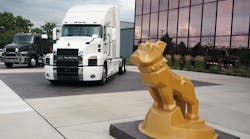United Auto Workers (UAW) union members who walked out of Mack Truck factories in mid-October officially ratified a new four-year collective bargaining agreement with the truckmaker over the weekend.
About 3,500 Mack Truck workers went on strike at six facilities in three states on Oct. 12 and returned to work Oct. 25. The contract was ratified on Nov. 3, according to Mack. At the time of the strike, the Mack workers were joining more than 50,000 UAW employees at General Motors, who had been on strike for a month. That strike has also since been resolved.
“Whether white-collar, blue-collar, union, non-union, they are all part of the Mack family: all of our colleagues,” Jonathan Randall, senior vice president of North American sales and marketing for Mack Trucks, said during the North American Commercial Vehicle Show in Atlanta on Oct. 28. “We are just delighted to have our UAW colleagues back to work with full pay and benefits. While you’re on strike, you get union strike pay not Mack pay. So it’s really, really good that that’s concluded and they’re back to work.”
UAW has six chapters at Mack plants in five cities. It said the strike is over wages, job security, schedules, overtime, skilled trades, workplace safety, seniority, benefits, health care, and temporary workers. Mack is part of the Volvo Group, which also produces Volvo trucks in North America. At least one of the Mack plants builds engines and transmissions for both truck brands.
“While we don’t disclose specifically production plans and capacity, per se,” Randall added, “I can tell you that it’s extremely well organized. We’re good at this at our factories and distribution centers. The re-ramp has started already and it’s progressing in a very big way.”
The strike temporarily stopped some production at Volvo Trucks’ Dublin, VA, plant and led to some temporary layoffs. The Mack plant in Hagerstown, MD, produces engines and transmission parts for both Mack Trucks and Volvo Trucks and without those parts, the Volvo production work in Virginia was not possible.
“The new agreement allows us to continue providing our UAW-represented employees and their families with an attractive package of wages and benefits while safeguarding the company’s competitiveness and supporting the success of our customers,” said Mack Trucks President Martin Weissburg.
The striking plants were in Allentown, PA; Middletown PA; Baltimore, MD; Jacksonville, FL; and two in Hagerstown, MD. UAW said it has “over 3,600 workers” in those locations, while Mack said it was “about 3,500.”
Mack officials said during the strike that there are no plans to close any of its U.S. plants. “We’ve invested more than $400 million in our plants and logistics network over the last 10 years,” Weissburg said at the start of the strike, “and since 2015 have insourced work that has created more than 500 jobs in our U.S. factories. We have significant new investments in both facilities and products on the way.”
Weissburg noted in October that Mack assembles all of its trucks and engines for the North American market in the U.S., while some of its competitors build products in “lower-cost countries.” Navistar and Daimler, for example, build some Class 8 trucks in Mexico for the U.S. market but also have significant facilities in the U.S.
Mack workers will be returning to a heavy-duty truck market that is slowing down as it returns to a more “normal” pace after a couple of hot years.
After a record-breaking 2018 for Class 8 trucks, the segment has seen a consistent waning in demand in 2019 as orders have outpaced production, leading to a backlog of trucks to be built since late last year. The backlog is about 130,000 trucks as of this fall — compared to the nearly 300,000 truck backlog a year ago this month.
“It’s been an interesting 18 months in the industry,” Randall told the trucking media a week before the strike. “And we can say that we’re seeing the cooling off — that is not a surprise — that we all expected. As you can see, the economy is normalizing from what you saw were some fairly significant numbers previously in growth — and not only in growth for GDP but also for our markets.”
“The Class 8 market this year is 325,000 trucks,” Randall said of the retail market for heavy-duty trucks in North America. “When we started our journey earlier this year, we were thinking it was going to be about 300,000 or 310,000. And we’ve bumped it several times since … There’s nothing that shows us from a retail standpoint that we’re not going to hit that number.”
Randall stressed during the American Trucking Associations’ show in San Diego in October that “normal does not equal bad.” He said to expect a Class 8 market in the mid-200,000 level as the industry works through the backlogs.




